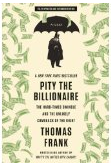Submitted by Peter Denison
 Pity the Billionaire: the Hard-times Swindle and the Unlikely Comeback of the Right — Thomas Frank, 2012
Pity the Billionaire: the Hard-times Swindle and the Unlikely Comeback of the Right — Thomas Frank, 2012
“Images of small men usually arise and persist widely because big men find good use of them.”
— C. Wright Mills in “White Collar“
Liberals may delight in quoting some of the outrageous comments written or spoken on radio or TV by some Right-wing commentators who sound like nutcakes. Yes, they do seem nutty, but as he shows, there is method in their madness. They have achieved what was unbelievable back in 2008, the almost total prevention of any type of Rooseveltian New Deal. How did the Right do it? To some extent they allowed “nuts” like Rush Limbaugh or Glenn Beck to give liberals something to sneer at while they worked on their campaign to make the one percent richer and more powerful than ever. They actually appropriated the language of radicalism which most in the Democratic Party had given up as too radical. As unemployment continued high, people became frustrated. Obama helped the Right by continuing President Bush’s program of bailing out the banks which had gotten us into this economic mess in the first place. When the Tea Party protested against Wall Street, the architects of the Right echoed their language and made it seem as if the Democrats were the party of Wall Street. They used populist language to defend their interests. Thus Representative Paul Ryan actually said, “Down with big business,” even while getting campaign funds from business leaders who knew what he really meant. Investment brokers were presented as ordinary workers just like one’s neighbors. Small business was presented as against big business and on a par with the ordinary Joe.
Why has their strategy worked so well? Largely because the Democrats didn’t know how to fight back. On the health care legislation, Obama concentrated first on saving money, and second on talking about all the details. Republicans could easily question his financial estimates, leaving the public confused and uninspired. Never once did Obama put the issue in moral terms, that it is outrageous that the richest country in the world can’t provide medical care to every single one of its citizens. The GOP would have a hard time disputing that point, but they never had to. Republicans were allowed to claim that Obamacare would take away liberties, denounce a coming police state, etc., and seize the emotional argument. In chapter ten, “The Silence of the Technocrats,” Frank gives an excellent summary of the struggle, and why the opposition won the political argument. Obama gave up on single payer, which he had previously favored, without firing a shot, rather than at least using it as a bargaining tool. Why did he do that?
To get that answer Frank turned to Obama’s The Audacity of Hope. On pages 113-114 Obama confessed that he found rich people charming and liberal (on social issues anyway) but didn’t like protectionism, unions, etc. “I know that as a consequence of my fund-raising I became more like the wealthy donors I met.” Frank doesn’t blame the debacle solely on Obama. The Democratic Party has wandered too far from its constituents, labor, minorities, the poor, etc., and has been seduced by too much funding from Wall Street. Maybe not enough liberals read Obama’s book with sufficient care to notice how weak his liberalism was, and is.
While the one percent may just regard the Right wing “nuts” as “useful idiots,” they also have their emotional blind spots. Many of them are under the sway of Ayn Rand’s philosophy as shown in her novel Atlas Shrugged. They feel oppressed by what Romney referred to as “the 47%,” freeloaders on the elite who are the job creators, and who could do so much more if they simply weren’t hampered by regulations and taxes.”. Frank’s description of Rand’s book is devastating, saying it consists of one dimensional characters written in leaden prose. Not having read it myself, I wonder if It is really that bad. It is still popular even though it’s over a thousand pages of reading. Be that as it may, the wealthy find it inspiring because it gives a rationale for opposing higher minimum wages,.food stamps, etc., even including Social Security.
Frank’s book makes good reading, is well documented, and the advice in it is good. Don’t concentrate so much on the lunatic Right. The wealthy behind them are smart, and have a good chance of completing their quest for total domination, rolling back all the reforms not only of the sixties, but of Roosevelt’s New Deal as well. They are really the ones we must oppose. There are always intellectuals who can be bought to provide slogans which can turn liberal principles topsy turvy.
